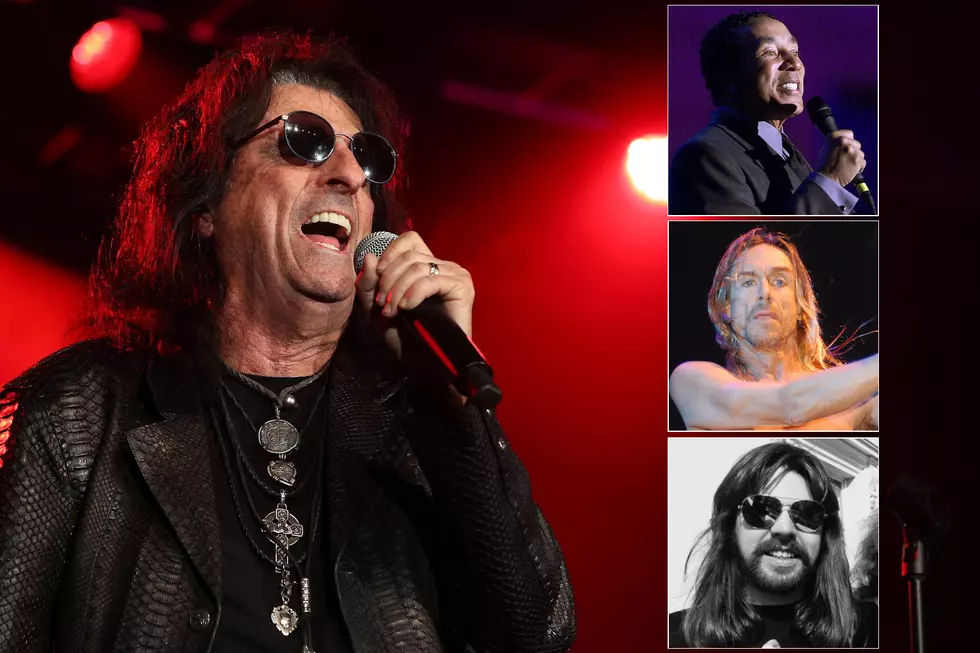
Alice Cooper Recalls the Artists Who Made Detroit Great: Exclusive Interview
While the Alice Cooper band got its start in California, they never fit in with the flower-power hippies who dominated the ’60s scene. Audience members were walking out of shows at gigs in and around Los Angeles so they didn’t have to endure their wild theatrics. Detroit, on the other hand, was a city in love with tough, bombastic music, and the band found a thrilled fanbase.
“In Detroit, if you went up there and said, ‘This is a song about love and roses,’ they would just kill you,” Cooper tells UCR in an exclusive interview. “They wanted hard rock with attitude.”
The man who became Alice Cooper was born Vincent Damon Furnier in 1948 in the Motor City, before moving west with his family in late childhood. Cooper’s latest album, Detroit Stories, pays homage to the sound and scene that launched his career. The singer collaborated with many who shared the stage with him back in the day, including MC5 guitarist Wayne Kramer, Grand Funk Railroad guitarist Mark Farner, drummer Johnny Bee of Mitch Ryder & the Detroit Wheels and original Alice Cooper bassist Dennis Dunaway.
UCR talked to Cooper about some of his Detroit favorites and his first impressions of the city’s epic ’60s and '70s run.
The Stooges
Alice and Iggy Pop (then Iggy Stooge) began sharing bills as early as 1970. From the get go, Cooper found a kindred spirit with a dramatically different aesthetic.
“We were two entirely different kinds of theater,” Cooper says. “The only things we had in common were that we were unapologetic about what we were doing and we were both loud, guitar-driven rock ‘n’ roll bands.”
Cooper remembers that the buzz around the Stooges was substantial when he returned to Michigan. He finally saw the band play live, and couldn’t believe the fury they brought to the stage.
“Iggy’s up there with this really basic band that’s powerful as hell,” Cooper says. “They aren’t trying to be anybody but themselves. It’s a three-chord band but it’s powerful, and Iggy is just all over the place and [standing] in the audience – and I saw the birth of punk right there. … Iggy was such a force of nature.”
Watch Iggy and the Stooges Perform Live in 1970
Motown
Despite being a hard-rock town, the city’s most famous sonic export is Berry Gordy Jr.’s Motown Records. On Detroit Stories, Cooper nods to the label’s groundbreaking pop-soul hybrid on “$1000 High Heel Shoes,” a tune he says demanded a Motown-like arrangement. The Godfather of Shock Rock and Diana Ross don’t seem like artists you’d ever find under the same roof, but Cooper remembers a community where musicians mingled freely.
“Another weird thing about Detroit was that Motown and rock ‘n’ roll were in bed together,” he explains. “We’d be playing and look down and there was Smokey Robinson in the crowd, and there was one of the Supremes, and there were two of the guys from the Temptations.”
Cooper describes a mutual admiration society of the highest order, full of Top 40 hits and gold records.
“They’re all there because it’s hot sweaty rock ‘n roll,” Coooper says of the Motown legends he saw in the seats. “It’s all just music to them. They are having the time of their lives. And the rock bands went and saw the Motown bands too. All it was about, ‘How good is the music?’ Both of these forms of music lived in Detroit side-by-side very successfully.”
Watch Smokey Robinson and the Miracles on the Ed Sullivan Show
MC5
Even before the Stooges and Alice Cooper took rock performances to the next level, MC5 blew minds with proto-punk and shocking volume. Cooper recalls being stunned the first time he saw Wayne Kramer’s band.
“We got invited to play a Pop Festival in Detroit and we get there three or four hours early and here’s the MC5, who I had never heard of before, and they are doing this show – a big show with energy, and they’re political, and they’re tearing the place up,” Cooper says.
The two bands shared bills but Cooper and Kramer lost touch for years. When Cooper decided his next album would be a celebration of Detroit, he knew immediately that he wanted Kramer to be part of it. The two wrote the furious rock track “Go Man Go” with guitarist Tommy Henriksen and producer Bob Ezrin, while Kramer also lent his sizable guitar chops to several other cuts on the LP.
Watch the MC5 Perform Live in Detroit
Bob Seger
Casual fans of Cooper and Bob Seger might think the two have never crossed paths. But not only did Cooper share bills with Seger, he also has a huge amount of respect for his fellow Detroit native.
“We did lots of shows back in the day with him,” Cooper recalls. “And he’s had more hits than any of us. Bob just kept making hit after hit after hit after hit.”
Cooper decided to close Detroit Stories with a gritty, stompin’ take on “East Side Story,” a 1966 song from Seger's tenure with the Last Heard that became his first regional hit. Of course, with a catalog dozens of albums deep, it may not even rank in Seger’s Top 100 songs.
Cooper went to see Seger in 2019 during his farewell tour. While backstage, Cooper revealed that he had just cut “East Side Story” for Detroit Stories.
“He looked at me and said, ‘Why?’” Cooper recalls with a laugh. “I told him, ‘Because I’m from the East Side.’ And that story line could be milked better. It was just a great story line. He said, ‘Wow, that's really amazing, I never thought anybody would cover that song.’”
Listen to Bob Seger and the Last Heard Perform 'East Side Story'
Alice Cooper Albums Ranked
You Think You Know Alice Cooper?




